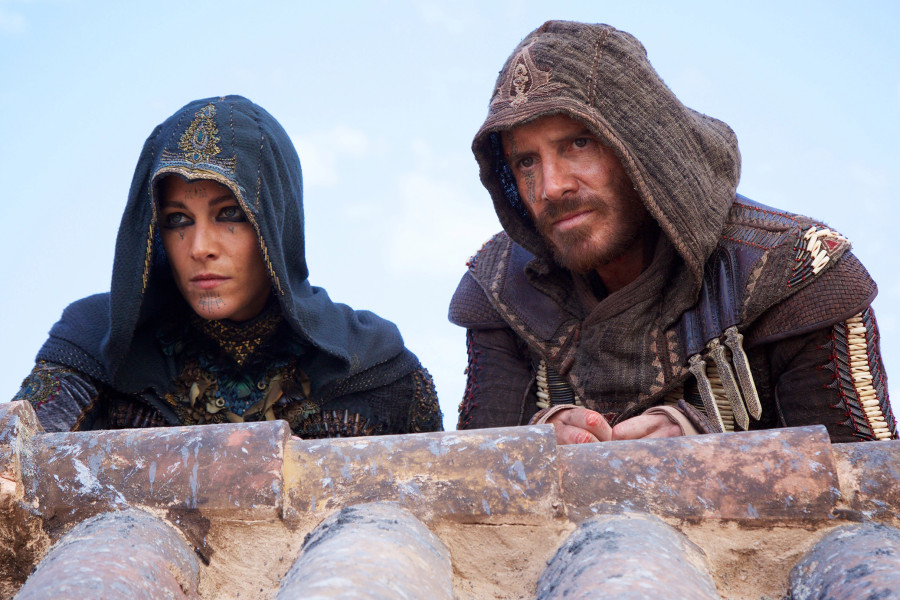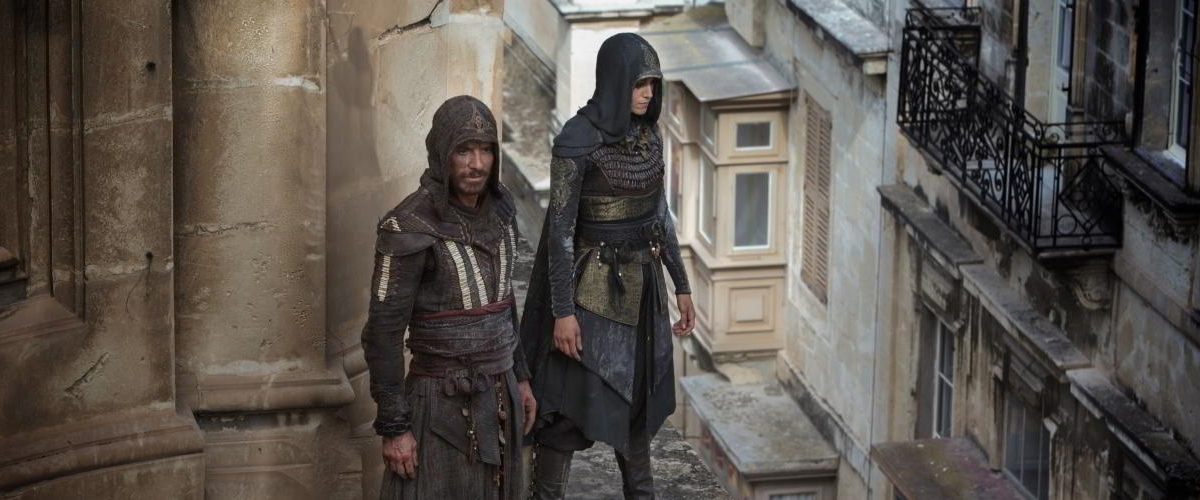The issue with adapting any modern video game into a feature film is that the source material is already trying to bridge that very gap. Most triple A titles (think blockbuster films of the game world) include an average of close to 65-70 minutes of cutscenes. Difference being that video games have a higher leeway when it comes to suspension of disbelief, as their target audience has no expectations of anything resembling realism. Attempting to translate this to the screen with po-faced seriousness is an exercise in futility and madness. That Assassin’s Creed throws all caution to the wind, feels kind of daring, if not at least refreshing. Sadly, it’s all marred by being both drably shot and intensely boring.

After a brief bit of text summing up the centuries raging war between the Assassins and Templars, we are greeted with the introduction of Aguilar (Michael Fassbender with facial hair) as he is being sworn into the order of Assassins stationed in Spain of 1492. He is tasked, along with a few others, to help quell the local Templar faction, who are searching for ‘The Apple of Eden”, an artifact said to hold the power to control free will of all people. Flashing forward to present day, Callum Lynch (Fassbender sans facial hair), is a death row inmate and possible abstract artist. His “execution” is faked and he finds himself the subject of an undisclosed experiment run by Sophia Rikkin (Marion Cotillard) through mega corporation Abstergo. Callum is constantly told that he isn’t a prisoner not is the facility a prison, though the constant patrol of guards, cameras and locked doors say otherwise. The experiment he has been chosen for deals with a contraption called “The Animus”, here represented by a form of demonic claw arm. When this device and a cortex scrambler are attached to the correct host, they are able to connect with past relatives through the power of bright lights and their dna. This is all conveniently -and not confusingly at all- explained by giant glass boards with photos, scribblings and string made by people who haven’t heard of Ancestry.com. Attempting to translate this to the screen with po-faced seriousness is an exercise in futility and madness. If any of this should sound like hooey, it can be used as a barometer of one’s entertainment level for the remaining hour & a half.

Assassin’s Creed believes that tackling its source material in the most grounded approach possible will engross the audience tenfold. The problem is that they lack the cohesion to do so in an interesting light. Everything that transpires within the Animus is shrouded in smoke and fog, then further mucked up by an overly desaturated palette. If you choose to view it in 3D, be forewarned that this will add yet another sheen to the proceedings, making what action there is, partially incomprehensible. This is a slight shame, as the action in ancient Spain threatens to bring things to life. Again, though, hope is short lived as the action intercuts between Aguilar doing 90% of the action, and then returning to the real world with Calling deliving the final blow. Over and over this continues, to make sure the audience remembers what is taking place. Strangely enough, this is the only instance where the movie goes out of its way to do such a thing.
None of the actors involved have a chance to really shine, or even go for broke. A version of Assassin’s Creed that wallows in camp, at least within the Animus, would have been much more enjoyable. As it stands, Fassbender at least feels engaged, partially due to his dual roles. While neither truly jump off the screen, there feels to be a pulse of humanity underneath his skin. Michael K. Williams plays Moussaka, but only has 2-3 chances to interact with other characters. To spice things up, his defining characteristic is hinted that he may have been a magician before becoming a subject in Abstergo’s experiment. Cotillard and Irons get the brunt of lesser scenes, at times feeling little more than ghosts. One has a penchant for changing accents every line, the other can’t button cufflinks and has his arms constantly folded. Comparatively, they at least get to have conversations with multiple people. Ariane Labed’s Maria, on the other hand, is stoically silent, unless alone with Aguilar, hinting that there may be a romantic connection, even though she constantly reminds him that love has no place in the brotherhood. She is allowed the best choreography to make up for the lapse, but the film passes out I.O.U.s it has no intention of honoring.

For years, numerous studios have attempted to find a way to tap into the video game fanbase to no avail. It isn’t entirely a fool’s errand, but the reverence with which the subject matter is often handled finds itself diametrically opposed to what endears that particular audience. Maybe the divide is trying to cater to everyone in the first place. If nonfiction stories get divided into “based on” and “inspired by” categories for film, then why can’t the same be done with video game adaptations? The blame probably falls to the studios, who want these pictures to be monster hits and nothing else. It’s forcing a square into a round peg. The worst crime Assassin’s Creed
commits is attempting to hew as close as possible to the source material without allowing the weirdness and insanity to take control. Boring and tepid are the last thing you want, in any adaptation.


